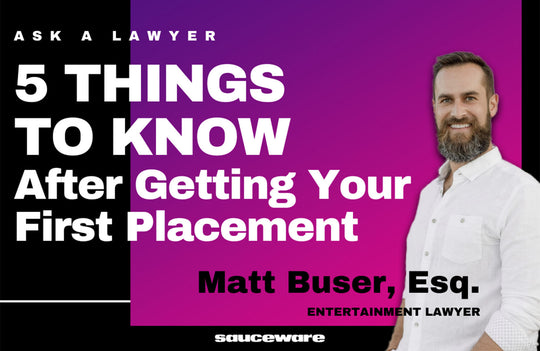
You got a placement. Now what?
5 things to know after getting your first placement from a producer lawyer.
We've gone ahead and summarized some of biggest gems and takeaways from our chat with producer lawyer, Matt Buser last week. This is all information producers need to be aware of.
#1 Do NOT sign producer declarations
Huge gem here from Matt is that producers should avoid producer declarations sent by the label. These are incomplete documents that often look exactly like producer agreements. What they don’t include is your publishing splits, royalty splits and a full breakdown on your fee.
Labels will send these declarations to side step the requirement of a full producer agreement so they can release the song. This happens a lot in the rap world especially, as tracks can come in at the last minute.
Matt’s advice: Let the label or manager know that you would “prefer to move to long form” which means they will send a full producer agreement with all of those details laid out in it.
Matt speaks more about what you need to know in this clip below:
#2 Register your business ASAP
Producers need to operate like a business from the jump. It takes very little money to register an LLC and get yourself a corporate bank account.
The big benefit for producers is now when you purchase studio equipment, studio time, and travel for production these expenses are deductible (you pay the government less taxes).
It also gives you some liability from certain situations. Say a co-producers used a sample that you were unaware of and those rights holders decided to sue, well if it is contracted through your LLC, your personal liability is more protected.
#3 Understand who is getting what
When a co-producer, label rep or manager hits you with an offer, make sure you have the FULL details. For example if you and another producer made the beat and they offer you:
- $2500 fee & advance (50% recoupable)
- 10% publishing
- 1% royalty rate
- Additional production credit
You would assume that the other producer is receiving the same. However,
Matt advises to always understand the full terms before proceeding. Meaning, you know what the other producer is receiving (fee, publishing split, royalty rate, credit) so that you can be on an even playing field.
You may find out that the other producer is receiving more for the same contribution. If you feel like you're owed more, it’s worth asking, but always remember…
#4 If you act like it's your last placement, it could be
That brings us to our next point that Matt made which is understanding your place with the record. A few really important things to consider:
- How involved were you in making the beat? (ie. was it a loop or drums you added?)
- If you have a co-producer(s), what is their relationship to the artist/label and did they help land the record?
- Is this your first placement?
- Do you have a history of placements and a standard fee?
Without taking some of these things into consideration, you could find yourself in an uphill battle to finalize your producer agreement. Matt had a great quote in our conversation, “are we fighting for what is fair or are we fighting for ego?”.
In an industry like ours with a lot of collaboration it’s important to ask yourself, is this fair? If it is, then proceed. This isn’t a statement to say settle for less, but more to consider the bigger picture.
If this placement goes through what type of future opportunities might I have? Is this the hill worth dying on? Also consider these things when negotiating your deals.
#5 When is the right time to look for a publishing deal?
The age-old question still doesn't have a direct answer. The reality is, everyone's situation is different and many of those circumstances come into play when entertaining the idea of a publishing deal. Here are a few of Matt’s tips summarized:
- There are a variety of deals and publishers out there so know what type of deal makes the most sense for you
- If you have a big song gaining traction, you’ll likely be approached by some publishers when it makes sense for both of you
- If you are interested in only administering a few songs, there are great services like Songtrust that will allow you to do deals for as little as 1 song with very low retention rates (the period after the term expires at which the administer can still take their cut)
- Are you looking for partners to supply sessions, studio time and sync pitching? If so, most of those services are limited when doing an administration deal so co-publishing might be the better option
- Be mindful around the 2 year mark of a song being out, if the song isn’t registered properly and the PROs (ASCAP, BMI, SOCAN) are unaware of who to pay, then the royalties are left into the dreaded black box and become much more difficult to collect.
If you’d like to know about the next FREE zoom call, sign up for our mailing list. When you do you’ll also get free one shots, midi and loops!